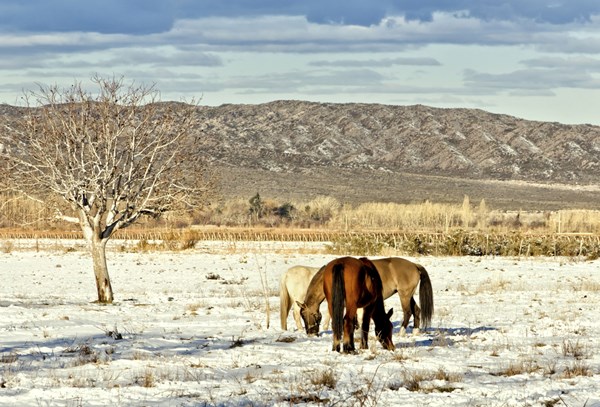 Credit: Thinkstock Horses need adequate water to keep the GI tract healthy, especially in cold weather when they might not drink as much.
Credit: Thinkstock Horses need adequate water to keep the GI tract healthy, especially in cold weather when they might not drink as much.Editor’s note: While this might seem like a basic article for this audience, often managers and trainers are busy with the start of winter and might not take the time to inspect waterers or ensure that staff or boarders understand the importance of having fresh water in front of horses all the time during winter.
When horses consume winter feeds, water requirements can increase. Hay and grain typically contain less than 15% moisture, while in contrast, pastures possess 60-80% moisture. There are two common complications resulting from inadequate water consumption during cold weather: decreased water intake and impaction colic. Even if quality feed is offered, horses will consume less if not drinking enough water. If less feed is consumed, horses might not have enough energy to tolerate the cold. Fecal contents must maintain adequate moisture levels. If fecal material becomes too dry, intestinal blockage or impaction can occur. This will not likely develop in one day, but can over time if inadequate water consumption occurs.
Most adult horses weighing 1,000 pounds require a minimum of 10 to 12 gallons of water each day for their basic physiological needs. During winter months, water should be kept between 45 to 65 degrees F to maximize consumption. Research found that ponies increased their water consumption by 40% each day when the water was warmed above freezing during cold weather. Increasing salt intake will also stimulate a horse to drink more; adult horses should consume one to two ounces of salt per day. Loose salt is preferred as many horses do not prefer to lick salt blocks during cold weather. However, under humid conditions, loose salt may crystalize and become rough.
Waterers should be cleaned regularly, and clean, fresh water should always be available, regardless of outside temperature. If using a tank heater to warm water, inspect it carefully for worn wires or other damage, and check the water for electrical sensations or shocks. Snow or ice is not an adequate water source for horses.
The authors of this article are K. Martinson, PhD, and M. Hathaway, PhD, Univ. of Minnesota. Sign up for the University of Minnesota horse newsletter on their website.


